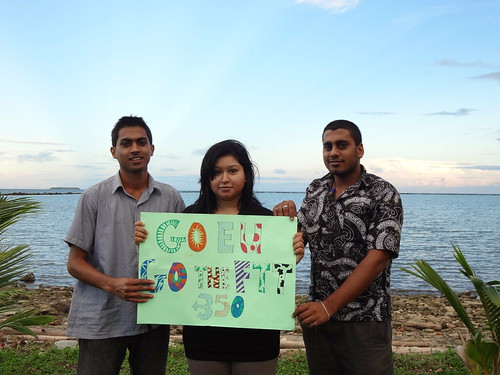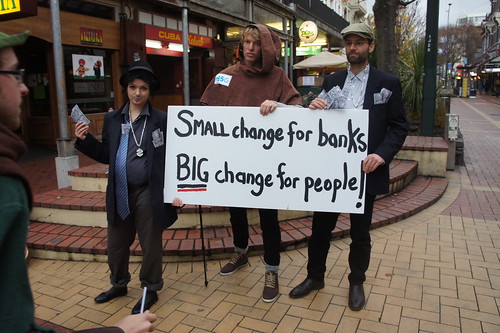The greatest injustice about climate change is that those who have done the least to cause the problem will suffer the impacts first and worst. As 350.org’s Pacific region coordinator, I work with young organisers in atoll nations like Kiribati and the Marshall Islands for whom this injustice defines their future. Every week I get emails from Pacific Island youth who are desperate to learn what they can do to prevent climate change wrecking havoc in their home village – from Papua New Guinea to the Cook Islands.
Building the 350 movement together we have achieved a lot – we have been able to amplify the voice of Pacific youth and vulnerable communities across the planet on the global stage. Next week, top organisers from 13 Pacific nations are coming together for a climate leadership workshop in Fiji. Through this workshop and follow up, we aim to reach another 1,000 Pacific youth with climate leadership education this year alone. It’s truly inspiring to be part of.
However, there’s the reality that we can’t avoid. We are now in a world already beyond the safe level of CO2 in our atmosphere, 350ppm, which means we are committed to massive climate disruption for the Pacific (and the rest of the world). With up to 1.6 metres of sea-level rise locked in by the end of the century, not to mention the nasty combination of periods of increased drought mixed with more powerful storms, everything in the Pacific is at risk — and it’s not their fault.
Where there is such injustice, we must respond. We’re already gearing up for a major day of moving mobilizations on 24 September — Moving Planet — calling for policies that can get us moving off fossil fuels and on track to lowering CO2 levels back below 350 ppm. Another key plank of our response is climate finance — to fund adaptation projects for the most vulnerable.
At the 2009 Copenhagen climate summit, world leaders pledged $100 billion dollars per year in funding for climate change action in poor countries (by 2020). Our friends at Oxfam contend (and we agree) that that sum is hugely insufficient. Furthermore, that money has to come from somewhere — it can’t just be redirected from existing aid programmes.

Yesterday, grassroots organisers around the world took action in over 35 countries to highlight a simple solution that could raise a good deal of what’s needed. It’s called the financial transaction tax – the FTT for short, or perhaps you’ve heard of it as the Robin Hood Tax. It is a tiny tax of 0.05 – 0.005% on speculative banking transactions that would generate billions of dollars to tackle climate change and poverty.
See more updates from the day, here: https://fttjune.posterous.com/
Organisations worldwide, including Oxfam and 350.org, are calling on governments to introduce an international FTT on the millions of large transactions that take place every day between financial institutions. In particular, attention is turned on the European Union – where heads of state are meeting later this week to consider implementing a EU-wide FTT.
A few days ago, a group of us dressed as Robin Hoods and Speculative Bankers pulled off a stunt in Wellington’s Cuba Mall to show our support of the Robin Hood Tax. We had breakdancers, and sang our song loud –
“Small change for banks, big change for people” and “It’s not taxing you or me – just the speculative transactions!”

This grabbed attention and was a lot of fun, but we still have a long way to go to make sure that we meet the climate finance needs of the most vulnerable and put the world on track to 350ppm. This represents a new area of focus for 350.org – we know we can't reach 350ppm in a just way without funding to support developing countries to adapt. So stay tuned in the future for more opportunities to take action on climate finance!